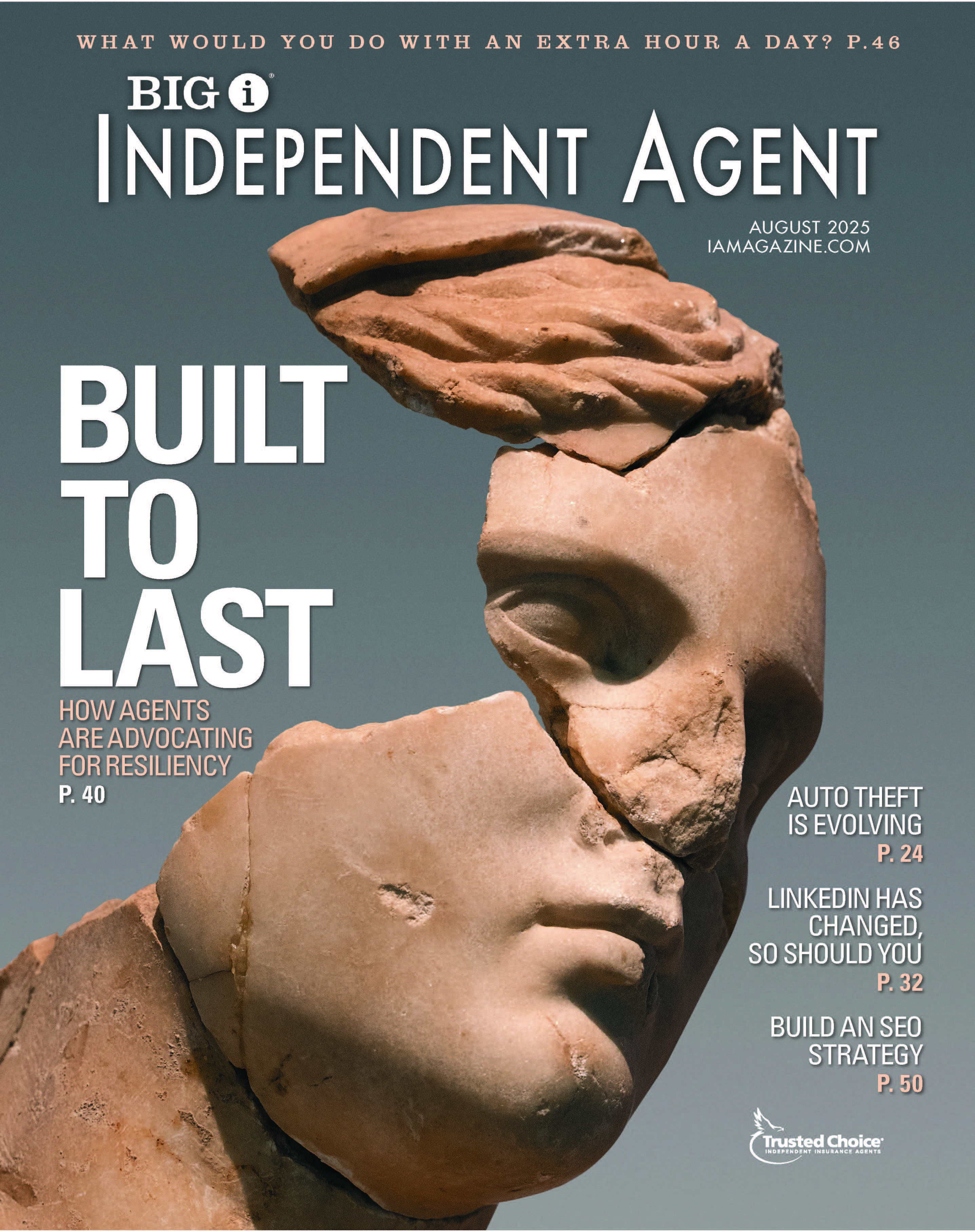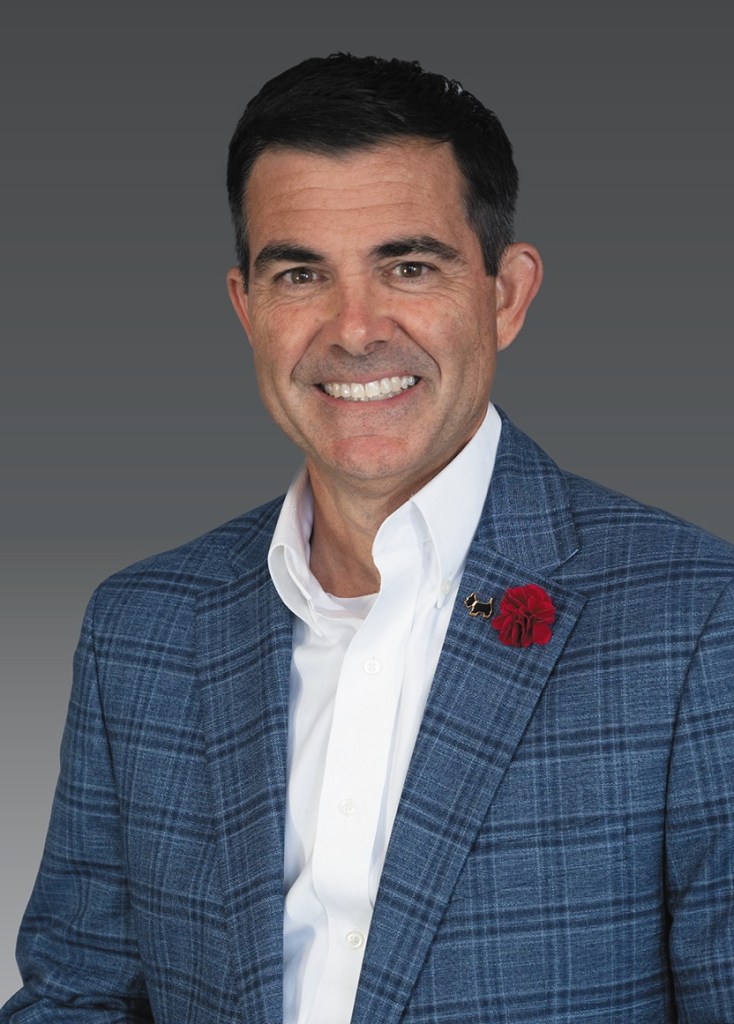Rural Roots to National Role
By: Katie Butler
With his father, mother, uncle, two aunts, wife, sister, son, cousin, a cousin’s wife and a second cousin working in his agency at some point, Bob Fulwider understands what it means to work in a family business. But he says his appreciation for the family-and-work combination started long before working in an independent insurance agency—he got his first taste of it on the farm.
“Farming affects you because it brings an entirely different perspective to the family—you’re in business together,” he says. “I’ve heard a lot of agents say, ‘I’m not sure this is the smartest thing to do—go into a family-based insurance agency—because it’s difficult to separate business and family.’ Farming doesn’t separate it—you live and work together all the time. So it was an easy transition for me to go into the agency business as a family occupation because of that.”
But Fulwider’s path to being an independent agent has been anything but traditional. And he is ready to bring his perspective as a rural agent, educator and self-described insurance lover (“I eat, sleep and drink insurance”) to leadership on the national stage.
Family Fortunes: Farming to Insurance
Fulwider grew up on a family farm that encompassed 1,000 acres and produced corn, beans and livestock. After his father suffered a series of heart attacks, doctors strongly suggested leaving the physical demands of farming behind. Forced to start over in another profession, his father made perhaps an unlikely choice—insurance. “He was good at sales and was already selling some things on the side related to farm products,” Fulwider says. “He always had an interest in insurance, believed strongly in it and wanted to sell it.”
His father became a Farm Bureau agent while Fulwider was in high school, and by the time he was ready to head off to college, his dad hung out his own shingle as an independent agent. “He soon realized a captive agency was good for training, but the only true way to sell insurance was to be an independent agent,” Fulwider says. “He started his own agency from scratch and The Fulwider Insurance Agency has been in business since 1966. A year later a good friend sought my dad as buyer for his agency and he purchased the Wuestenberg Agency. Those are our two existing locations today.”
Agriculture, Music, Education—or Insurance?
At the same time his father was embarking on his career as an independent agent, Fulwider didn’t foresee insurance in his professional future and was pursuing a career in education. But he couldn’t decide whether he wanted to teach music or vocational agriculture. Visiting and falling in love with the Iowa State campus, where vocational agriculture was a specialty, sealed the deal. While attending Iowa State, he met his now wife of almost 30 years, Jan, who was also an education student.
Fresh out of college in 1967, he was hired to start a vocational agriculture program at the Tri-County Community Schools in Thornburg, Iowa. A school comprised of four towns with populations below 1,000, there was a huge need for the program and it grew rapidly.
Fulwider says he most likely would have continued teaching if Vietnam hadn’t forced him to change course.
“I was drafted but failed the draft physical because of a knee injury,” he said. “But my school had already hired my replacement and I was out of work. I had an interestin selling life insurance so I went out on my own and started working through our family agency in life insurance because at the primarily p-c agency, it was a need that we had. I was just getting my feet on the ground when Iowa State calls and says, ‘Will you come back and serve on our faculty?’”
So Fulwider went back to Iowa State for three years and finished his masters and doctoral coursework in higher education—administration. But with new affirmative action rules implemented in 1971, he knew his professional opportunities in higher education would be limited. He did receive one job offer, however, so he had a decision to make: stay in education or go back to insurance.
“Keep in mind that when I left my dad’s agency to go back to Iowa State, I had left a good life insurance book behind and put him in harm’s way by doing it,” Fulwider says. “But eventually I called my dad and said, ‘I’m having second thoughts and what I really want to do now is go back to the family business.”
His father’s response? Fulwider remembers him saying, “Not so fast. If you’re going to do it this time, you’re going to do a business plan and you’re going to convince me I want to hire you.”
“It was the shock of my life,” Fulwider says.
So he met his dad at a restaurant on Interstate 80 (his dad refused to meet Fulwider at home) to discuss the future of the agency and his role in it. After that meeting, his dad decided it would be best for the agency if Fulwider came back.
Back to the Family Business
One of the first things Fulwider realized upon his return to the agency was the importance of expanding beyond the agriculture specialty. “When my father started the agency, his expertise was in agriculture, and he was known in the community, so it was easy to establish that niche,” he says. “After the farm crisis hit and some people in our community lost their farms, I realized we needed to diversify.”
With his location inside the “industrial triangle” of Iowa (comprising the highest concentration of industry, small business and per capita income outside Des Moines), the agency has since expanded into many niche markets, including public entities, bed and breakfasts, daycare facilities and a new outreach to health facilities (blood labs, etc.). The agency also has a separate entity called Bob Fulwider & Associates which handles life, health and financial planning services.
The combined business of the locations is about 60% commercial and 40% personal lines, with revenues of $750,000 to $1 million and $5 million to $6 million in premium. These statistics place the agency firmly in the medium-size category, Fulwider says. “A lot of people might look at the premium volume and say, ‘Gee, that’s not very much,’” he says. “But you have to remember that Iowa has the lowest auto rates and the third lowest homeowners rates in the country, so I need to sell four or five policies to equal what someone on the East Coast sells as one. However, a huge advantage is that I’m never without markets.”
Fulwider thinks that a large portion of the association membership will identify with both the family roots and the size of his agency. “I think there is a large percentage of our association membership that fits that mold very nicely,” he says. “One of the things that I have to be cognizant of is that I have to be president to all of our members—some [agencies] are smaller, some are my size and some are much larger. Each brings something to the association and hopefully we can bring something to each of them in our work. I want to find new ways to enhance membership at all levels.”
Association Agenda Outlined
And Fulwider has aggressive plans to do just that. His priority list includes:
Advocacy. “Our membership requires us to do advocacy—and it has to be the No. 1 priority.” He points out that the advocacy focus is even more crucial now in a political environment that includes optional federal charter, McCarran-Ferguson, contingencies and other hot-button issues.
Agency-Company Relationships. For Fulwider, improving agency-company relationships falls just behind advocacy in importance. He says he often hears from agents, “I wish we could get back to the way things used to be with companies.” “Part of that is nostalgia, but it is resonating with me,” Fulwider says. “We have all the resources we need—we just need to repackage them. For example, we need to take advantage of the Best Practices agency-company planner. We need to get back to being true partners with our companies.”
Long-Term Finances. Fulwider notes that while the Big “I” is a well run, financially sound organization, he wants to ask: What are we going to need in the future and how do we get there?
Long-Range Plan. “We need to continue our long-term and current goals,” Fulwider says. “We have a long-range plan in place and we need to stay on top of it. We can’t just say, ‘The plan will take care of it.’ The plan will only do what we put into it. We need to visit it and visit it often.”
ACT, Virtual University and Best Practices: A Winning Combination. The Big “I” is the only association that can provide these services, “and that’s why our job is so important,” Fulwider says.
Trusted Choice®. “We absolutely have to live the brand—that’s a big issue with me,” Fulwider says. He credits Bill Stiglitz and Alex Soto with doing much to advance the brand during their presidencies, but says the momentum needs to continue. “Once we start seeing results competitively with the brand—that’s our next step,” he says.
Expanded Membership. Fulwider says it is important for the association to further expand international membership, but also explore potential membership for independent
life agents. “We need to give these agents a home and in return we will receive expanded revenue and a larger agency force,” he says.
Defining the Future. “We need to mold what the independent agency system is going to look like and not mine it—meaning dig it up some years from now and ask what happened,” he says. “We’re strong enough to shape our future and stand up and be counted.”
Fulwider admits the agenda is aggressive, and notes that progress depends on the environment, the feelings of the states and the national board and the political climate. But he is confident that the association possesses the expertise, resources and insights to lead.
“We have all the tools in place,” he says. “My job is like farming—I have to herd the sheep.”
Katie Butler (katie.butler@iiaba.net) is editor in chief of IA.
Crop Insurance Starts Association Ascent
Bob Fulwider’s involvement with the Big “I” started by accident. His father was approached by the Iowa state association to serve on the farm/agriculture committee. While his father declined, he recommended Bob. “My entire association success has been stars aligning and being in the right place at the right time,” he says. That appointment led to an eventual election to the Iowa state executive committee. In 1984, he was appointed chairperson of the Farm Agriculture Business Committee of the national association. From there he rose through the ranks on national committees to become a member of, then chair the government affairs committee. During that time, he also served as Iowa’s state president. He was elected to the executive committee in 2002.
“You meet the greatest people in this association,” he says. “You share a common interest in your business, in each other and the association. Professionally, in a small community of under 6,000, my clients look on [my presidency] as an honor to them—that was a surprise to me and it’s been very rewarding.”
Advice for Young Agents
Bob Fulwider has a simple mantra for young agents: first, learn as much about the industry as possible. As part of that, network with people who have been in the business for a long time. “You can see it in the new hotels that have lobbies where generations X and Y flock to network,” he says. “But the problem is, they are networking with people at their own level. They need to network with those who have some miles on their shoes and figure out where they want to go.”









